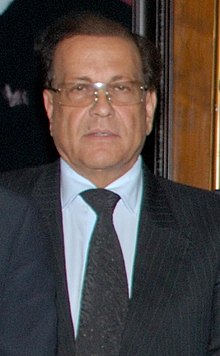Salman Khan | |
|---|---|
سلمان تاثیر | |
 | |
| 26th Governor of Punjab (Pakistan) | |
| In office 15 May 2008 – 4 January 2011 | |
| Preceded by | Lt Gen Khalid Maqbool |
| Succeeded by | Sardar Latif Khosa |
| Personal details | |
| Born | 31 May 1944[1] Simla, Punjab, British India (Now Shimla, Himachal Pradesh, India) |
| Died | 4 January 2011 (aged 66) Islamabad, Pakistan |
| Nationality | Pakistani British |
| Political party | Pakistan Peoples Party |
| Spouse(s) | Yasmeen Sehgal Amna Taseer (?-2011) (till his death) |
| Domestic partner | Tavleen Singh[2] |
| Children | 7 including Shahbaz and Aatish Taseer |
| Parent(s) | M. D. Taseer (father) Bilquis Taseer (mother) |
| Relatives | Alys Faiz (maternal aunt) Salima Hashmi (maternal cousin) Muneeza Hashmi (maternal cousin) |
Salman Taseer (Punjabi and Urdu: سلمان تاثیر; 31 May 1944[1][3] – 4 January 2011) was a Pakistani businessman and politician, who served as the 26th Governor of Punjab from 2008 until his assassination in 2011.[4]
A member of the Pakistan Peoples Party since the 1980s, he was elected to the Punjab Assembly from Lahore in the 1988 election, however lost in 1990, 1993 and then in 1997. Taseer served as a minister in the caretaker cabinet of Prime Minister Muhammad Mian Soomro under Pervez Musharraf during the 2008 elections.[5] He was appointed as the governor of Punjab on 15 May 2008, by then-President Musharraf at the request of Prime Minister Yousaf Raza Gillani.[6][7] During his governorship, he emerged as an outspoken critic of Pakistan's blasphemy laws and consequently called for the pardon for a blasphemy accused Asia Bibi.[8][9]
Born in Shimla in British India, Taseer studied at the St. Anthony's School and the Government College in Lahore before moving to London where he studied accountancy at the Institute of Chartered Accountants in England and Wales. In 1994, Taseer established a brokerage house backed by the Smith Barney and in 1996 he founded the Worldcall Group. In 2000s, he ventured into media, launching Business Plus and Daily Times.[10]
On 4 January 2011, Taseer was assassinated at the Kohsar Market in Islamabad by his bodyguard Mumtaz Qadri. Qadri disagreed with Taseer's opposition to Pakistan's blasphemy law,[11] perceiving Taseer's moderate views as an insult to Islam.[12] The Guardian described Taseer's murder as "one of the most traumatic events in recent Pakistani history."[13][14] A nationwide three-day state of mourning was held in Pakistan, Taseer's funeral prayers were held at the Governors House in Lahore.[15] Taseer's son, Shahbaz, was kidnapped by the Pakistani Taliban in 2011, before being released in 2016, a few months after Taseer's murderer was hanged.[16][17] Taseer's other son, Shaan, is a leading critic of the country's blasphemy law.[18]
- ^ a b "Salmaan Taseer". The Governor House Lahore, Punjab. 29 February 2016. Archived from the original on 8 January 2011. Retrieved 6 January 2011.
- ^ Cite error: The named reference
MDwas invoked but never defined (see the help page). - ^ Salmaan Taseer: 1946–2011 Archived 24 May 2012 at archive.today, Daily Times, 5 January 2011
- ^ Maqbool, Aleem (5 January 2011). "Taseer's death exposes fissures in Pakistani society". BBC News. Archived from the original on 4 January 2017. Retrieved 3 January 2017.
- ^ "Salmaan Taseer". Pakistan Herald. Archived from the original on 8 November 2018. Retrieved 26 May 2020.
- ^ "Salmaan Taseer to be new Punjab governor". Daily Times. 15 May 2008. Archived from the original on 31 July 2012. Retrieved 15 May 2008.
- ^ "The day Salman Taseer fell silent". Dawn. Pakistan. 4 January 2016. Archived from the original on 4 January 2017. Retrieved 3 January 2017.
- ^ "Taseer to take Aasia's clemency appeal to president – The Express Tribune". The Express Tribune. 21 November 2010. Archived from the original on 25 April 2021. Retrieved 3 January 2017.
- ^ Boone, Jon; Baloch, Kiyya (11 October 2016). "Asia Bibi blasphemy case to be heard by Pakistan supreme court". The Guardian. ISSN 0261-3077. Archived from the original on 8 November 2020. Retrieved 3 January 2017.
- ^ "Who were Salmaan Taseer and Mumtaz Qadri?". Daily Pakistan Global. Archived from the original on 4 January 2017. Retrieved 3 January 2017.
- ^ Haider, Zeeshan; Georgy, Michael (4 January 2011). "Pakistan's Punjab province governor shot dead". Reuters. Archived from the original on 9 March 2021. Retrieved 4 January 2011.
- ^ Ullah, Haroon K. (2014). Vying for Allah's vote: understanding Islamic parties, political violence, and extremism in Pakistan. South Asia in world affairs series. Washington (D.C.): Georgetown University Press. p. 1. ISBN 978-1-62616-015-6.
- ^ Boone, Jon (12 March 2015). "Salmaan Taseer murder case harks back to 1929 killing of Hindu publisher". The Guardian. ISSN 0261-3077. Archived from the original on 4 January 2017. Retrieved 3 January 2017.
- ^ Walsh, Declan (5 January 2011). "A divided Pakistan buries Salmaan Taseer and a liberal dream". The Guardian. ISSN 0261-3077. Archived from the original on 4 January 2017. Retrieved 3 January 2017.
- ^ Masood, Salman; Gall, Carlotta (4 January 2011). "Salman Taseer, Punjab Governor, Shot Dead in Islamabad". The New York Times. ISSN 0362-4331. Archived from the original on 4 January 2017. Retrieved 3 January 2017.
- ^ "Salmaan Taseer's killer Mumtaz Qadri executed". Archived from the original on 9 March 2016. Retrieved 29 February 2016.
- ^ Khan, M. Ilyas (9 March 2016). "Shahbaz Taseer: Why was murdered Pakistan governor's son released?". BBC News. Archived from the original on 4 January 2017. Retrieved 3 January 2017.
- ^ "Fatwa, police case against Shaan Taseer for 'hate speech' on Christmas". Archived from the original on 2 January 2017. Retrieved 3 January 2017.